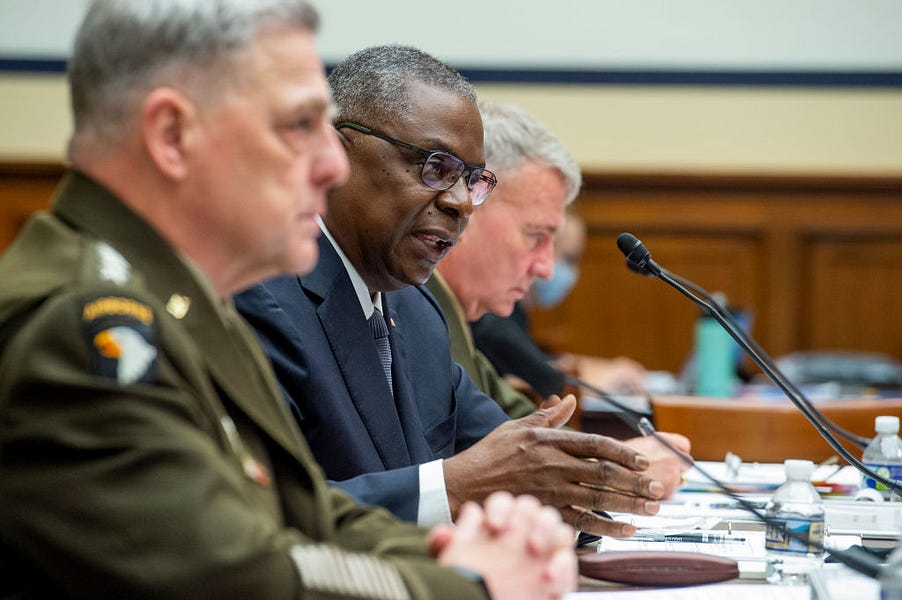Anyone stumped by President Joe Biden’s unwavering adherence to a single path for the American combat mission in Afghanistan need only glance backward 12 years. From Barack Obama’s inauguration in 2009 onward, the former Delaware senator was the administration’s staunchest and loudest voice opposing the continuation of the United States’ war in Afghanistan.
“I am not sending my boy back there to risk his life on behalf of women’s rights!” Biden famously said in 2010, after Obama’s “surge” deployed tens of thousands additional troops to Afghanistan, and very likely around the same time Beau Biden suffered the stroke that would first portend his battle with terminal brain cancer. The vice president’s outspokenness on the matter of Afghanistan was, according to some, a source of tension with the former president.
In a quest to finish unfinished business, it now seems, Biden overlooked guidance from dissenters within his own administration to move forward with a full withdrawal.
In the month since that withdrawal, media leaks emanating from different bureaucratic arms of the federal government have offered clarifying—but more often, conflicting—narratives of the departure’s final days. Nobody foresaw the rate at which the Taliban advance would sweep Afghanistan (save the intelligence agencies!). President Biden heeded the advice of his military advisers every step of the way (except when he didn’t!). The civilian evacuation went as well as could have been expected given time constraints (but the Pentagon urged that it start much, much sooner!).
This week, three senior Pentagon officials—Defense Secretary Lloyd Austin, Joint Chiefs Chairman Gen. Mark Milley, and CENTCOM Commander Gen. Kenneth “Frank” McKenzie—appeared before the House and Senate for the first time since the drawdown’s completion last month. Their spoken testimonies (and unspoken subtext) shed new light on the interagency squabbles dominating the administration’s Afghanistan policy. Here’s a timeline of what we can parcel together now.
When Biden came to office in January, he inherited a U.S. military presence in Afghanistan of about 2,500 troops. According to Bill Roggio, senior fellow at the Foundation for the Defense of Democracies and editor of its Long War Journal, this force had been sufficient to prevent the collapse of the Afghan government.
But Biden also—as has been pointed out by the administration on more than one occasion—inherited an agreement, inked in Doha, Qatar, by the Trump team in early 2020, to reduce U.S. forces to effective zero by May 1, 2021. As Milley explained during Tuesday’s hearing, however, that deal was contingent on the Taliban’s adherence to seven conditions—six of which it flouted, despite the U.S.’s full cooperation prior to May 1.
As the Joint Chiefs of Staff chairman conceded this week—and as Vital Interests’ Thomas Joscelyn expanded on in great detail before the Senate Armed Services committee yesterday—the Taliban and al-Qaeda enjoy symbiotic and longstanding ties in violation of the agreement.
With knowledge of the unbroken alliance in hand, generals up the ranks of the Pentagon advised the president to keep residual forces in Afghanistan, but, short of that, to avoid establishing a set end date to the U.S.’s military presence. “As a matter of professional advice, I would advise any leader, don’t put date certains on end dates,” Milley said during the Senate hearing, declining, for procedural reasons, to state whether he made such a recommendation to Biden. “Make things conditions-based.”
But on April 14, the White House announced its unconditional retreat from Afghanistan, keeping a deadline but pushing it back several months to September 11. Two weeks later, on the Trump administration’s original departure date of May 1, the Taliban and al-Qaeda began coordinated military offensives across Afghanistan.
By May, the Taliban’s early territorial gains and the U.S.’s continued drawdown at the behest of the president forced the Pentagon to rework its recommendation. When it became clear that there remained dwindling hope to hold Bagram or retain a residual presence, Politico reported Tuesday, the generals adopted the mantra of “speed equals safety” and urged the administration to begin a noncombatant evacuation operation (NEO).
The White House and State Department snubbed that recommendation, too, citing concern that such a step would undermine the Afghan government and prompt mass departures. Asked what he would change about the decisions made by the Biden administration vis-à-vis Afghanistan Tuesday, McKenzie said he would have begun the evacuation of civilians sooner.
Nearing the end of May, a Defense Department watchdog published a report warning that the Taliban was upping attacks on the Afghan security forces (ANSF) and poised for “large-scale offensives” into populated urban centers countrywide. The Taliban, true to form, publicized its intent to resurrect its Islamic Emirate through military conquest.
But the administration kept up appearances anyway, relying on an impending “negotiated settlement” to explain away troubling territorial losses. “So one of the things that we certainly wanted to see was progress being made in the Doha negotiations,” Austin said Tuesday. “[The president] did not see any progress being made and there was really not much of a bright future for that process.”
In early June, the Pentagon announced that the U.S. had abandoned Bagram. By mid-June, 80 of Afghanistan’s nearly 400 districts, in all corners of the country, had fallen under the Taliban’s control. By late-June, that number rose to 120. “It should have been abundantly clear to the casual observer that the Taliban was in danger of overrunning the country at that point,” Roggio said.
It’s this that frustrates Roggio and other Afghanistan analysts when the administration, lawmakers, and media parrot the claim that the Afghan government fell in 11 days. “Either they’re saying this to provide cover for the failure or they just didn’t understand what was happening,” Roggio said. “I suspect it’s the former—I think it’s intentional.”
On August 6, the Taliban moved in on Nimruz’s capital of Zaranj, capturing its first full province. Even as other provincial capitals fell in rapid succession, the Pentagon refrained from ordering an evacuation operation or reoccupying Bagram in anticipation of an evacuation (the base remained under ANSF control). According to Austin, holding the base would have “contributed little to the mission we had been assigned: to protect and defend our embassy some 30 miles away.”
One week later, as Taliban fighters entered Kabul and Afghan President Ashraf Ghani fled the country, the Defense Department finally issued orders to secure Kabul’s Hamid Karzai International Airport and begin the evacuation of civilians. The rushed evacuation and the many thousands of people it left behind now begs the question: Why did we wait?







Please note that we at The Dispatch hold ourselves, our work, and our commenters to a higher standard than other places on the internet. We welcome comments that foster genuine debate or discussion—including comments critical of us or our work—but responses that include ad hominem attacks on fellow Dispatch members or are intended to stoke fear and anger may be moderated.
With your membership, you only have the ability to comment on The Morning Dispatch articles. Consider upgrading to join the conversation everywhere.